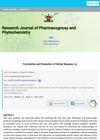 7 citations,
January 2019 in “Annals of dermatology/Annals of Dermatology”
7 citations,
January 2019 in “Annals of dermatology/Annals of Dermatology” Synthetic ceramides may help hair growth by boosting cell growth in hair follicles.
4 citations,
June 1983 in “The Journal of dermatologic surgery and oncology” Synthetic fiber hair implants often cause complications and are not very successful.
 3 citations,
June 1981 in “PubMed”
3 citations,
June 1981 in “PubMed” Taking hormonal contraceptives can cause skin changes, including hair loss, due to the effects of synthetic sex hormones.

research Hair
1 citations,
January 2016 in “Springer briefs in molecular science” The document suggests using safer, plant-based hair products instead of harmful synthetic ones.
 February 2025 in “International Journal for Research in Applied Science and Engineering Technology”
February 2025 in “International Journal for Research in Applied Science and Engineering Technology” The herbal shampoo is a safer alternative to synthetic shampoos but needs more testing for effectiveness.
 May 2024 in “Current perspectives on medicinal and aromatic plants”
May 2024 in “Current perspectives on medicinal and aromatic plants” Plant-based treatments might help with hair loss and have fewer side effects than synthetic drugs.
 May 2024 in “Microbial Biosystems Journal”
May 2024 in “Microbial Biosystems Journal” Herbal shampoos are as effective and safer than synthetic antifungal shampoos for treating Seborrheic dermatitis.
 October 2023 in “International journal of biology, pharmacy and allied sciences”
October 2023 in “International journal of biology, pharmacy and allied sciences” Personalized treatment plans combining natural and synthetic approaches are important for managing alopecia effectively.
 July 2023 in “International journal of pharmacognosy and life science”
July 2023 in “International journal of pharmacognosy and life science” The herbal hair oil made from various plants might be a good alternative to synthetic hair loss treatments.
 December 2020 in “مجله كليه طب الكندي”
December 2020 in “مجله كليه طب الكندي” Alopecia, or hair loss, can be caused by genetics, illness, or certain drugs, and can be treated with synthetic or natural medications.
 April 1906 in “The American Journal of the Medical Sciences”
April 1906 in “The American Journal of the Medical Sciences” Keratosis Pilaris Atrophicans causes skin scarring and might be treated with a new synthetic retinoid.
 October 2023 in “Journal of Cosmetic Dermatology”
October 2023 in “Journal of Cosmetic Dermatology” A synthetic octapeptide may help promote hair growth and counteract hair loss.

The document concludes that scientists created various steroids with different properties, including a more effective semi-synthetic vitamin D.
 December 2020 in “International journal of research in ayurveda and pharmacy”
December 2020 in “International journal of research in ayurveda and pharmacy” Eating well and avoiding synthetic hair products are key for healthy hair.
12 citations,
September 1997 in “PubMed” Vitamin D could be important for many skin functions and synthetic versions may treat various skin diseases.
11 citations,
November 2009 in “Journal of steroid biochemistry and molecular biology/The Journal of steroid biochemistry and molecular biology” Bolandiol, a synthetic steroid, builds muscle and bone without greatly affecting sex glands, and works differently from other hormones.
 1 citations,
June 2022 in “International Journal of Health Sciences (IJHS) (En línea)”
1 citations,
June 2022 in “International Journal of Health Sciences (IJHS) (En línea)” Herbal hair oils help with hair problems and are safer than synthetic products.
August 2023 in “Health Sciences and Pharmacy Journal” Herbal therapies may effectively treat alopecia with fewer side effects than synthetic drugs.
 May 2022 in “International Journal of Biochemistry Research and Review”
May 2022 in “International Journal of Biochemistry Research and Review” Plant-based biotin from SesZenBioTM could be twice as effective as synthetic biotin for hair care.
 41 citations,
July 2015 in “Current Drug Discovery Technologies”
41 citations,
July 2015 in “Current Drug Discovery Technologies” Some plants may help with hair growth and have fewer side effects than synthetic drugs, but more research is needed to confirm their effectiveness.
 24 citations,
January 2015 in “Annals of Dermatology”
24 citations,
January 2015 in “Annals of Dermatology” Herbal extracts may help hair grow and could be an alternative to synthetic hair loss treatments.
 15 citations,
January 2016 in “Sustainable development and biodiversity”
15 citations,
January 2016 in “Sustainable development and biodiversity” Using PGPR as biofertilizers can improve soil health and plant growth while reducing reliance on synthetic fertilizers.
 1 citations,
October 2023 in “International journal of Ayurveda and pharma research”
1 citations,
October 2023 in “International journal of Ayurveda and pharma research” Herbal medications might be safer and more effective for hair loss than synthetic treatments.
 1 citations,
December 2016 in “Trichology and cosmetology:”
1 citations,
December 2016 in “Trichology and cosmetology:” Panax ginseng might help with hair growth and has fewer side effects than synthetic treatments.
 November 2024 in “Research Journal of Pharmacognosy and Phytochemistry”
November 2024 in “Research Journal of Pharmacognosy and Phytochemistry” Herbal shampoo with beetroot and sunflower is safer and better for hair and scalp than synthetic shampoos.
June 2024 in “Deleted Journal” Herbal plants may help treat hair loss with fewer side effects than synthetic drugs.
 June 2021 in “CRC Press eBooks”
June 2021 in “CRC Press eBooks” Plant-based hair care products can effectively treat hair loss with fewer side effects than synthetic treatments, and more research is needed for their development.
 March 2021 in “International journal for research in applied science and engineering technology”
March 2021 in “International journal for research in applied science and engineering technology” Herbal hair dyes from tannin-rich plants are effective and safer than synthetic dyes.
27 citations,
May 2019 in “Jo'jig gonghag gwa jaesaeng uihag/Tissue engineering and regenerative medicine” The best method for urethral reconstruction is using hypoxia-preconditioned stem cells with autologous cells on a vascularized synthetic scaffold.
2 citations,
April 2020 in “International journal of research in pharmaceutical sciences” Using Malaysian medicinal plants in cosmetics can treat skin and hair issues with fewer side effects than synthetic products.























